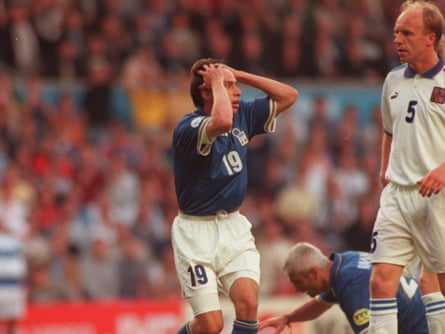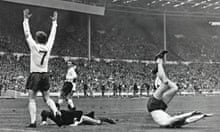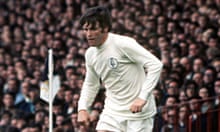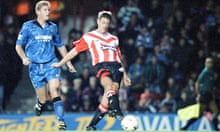Had ‘hipster teams’ been a real thing back in 1995-96, Slavia Prague would have out-strutted their popular-culturally relevant neighbours Dukla. Coming from leftfield to reach the Uefa Cup semi-finals, their company of un-ironic haircuts would have become public property two decades on: Slavia had not won their domestic league for 49 years; they would this time, but not before they had disposed of Sturm Graz, Freiburg, Lugano, Lens and – stunningly – Roma in a European campaign that had not been signposted to the casual observer. Even their eventual defeat to Bordeaux did not dilute the story all that much.
The urgency to find the next told-you-so thing had not quite reached today’s fevered levels – and nor, it should be said, had eastern European leagues deteriorated to the extent they have now – so Slavia’s dalliance with the very top turned relatively few heads abroad. It was not a place you would look to for clues about greatness, for suggestions that, gestating somewhere in results that you could find in a newspaper only if you squinted hard enough, was a memory that would become universal. When the moment arrived it would be something for the curio shop: an exotic souvenir of inaccessible provenance.
But the clues were there, buried within. Today, English television channels might have screened the last-16 tie with Lens that was dramatically settled by an impossibly quick young winger; they would certainly have been paying closer attention in the next round, when the same player deceived Roma goalkeeper Giovanni Cervone with a deep, in-swinging free-kick. Today, Chelsea fans might have joined the dots and remembered the generously-coiffured forward who had won a penalty against them for little Viktoria Zizkov the season before.
So Karel Poborsky had given notice that the unexpected was within reach but, largely boxed out of view, found himself suffering similar problems to Schrödinger’s cat. Five of his Slavia team-mates joined him in travelling to England for Euro 96; all were considered blank pages as far as a buoyant, expectant English public preoccupied with its own moment in time was concerned – even if the promise of their former team-mate, Borussia Dortmund’s Patrik Berger, had starred in various preview pieces. The Czechs had qualified for the tournament well, ahead of Holland in their group and, with the old Czechoslovakia having been tournament stalwarts, seemed in the curious position of providing little novelty value despite barely possessing a household name.
See them stand in line before their first group game, against Germany at a significantly below-capacity Old Trafford, and Poborsky is the first to be panned past by the camera; then his Slavia team-mate, the blond, impassable Radek Bejbl; next to him the quiffed, cheekboney Pavel Nedved, whose Sparta Prague side had made it to the Uefa Cup’s last 16. All would go on to spend long days in the sun, but a regulation 2-0 defeat meant that their images burned into few retinas straightaway. Poborsky was replaced by Berger at half-time.
Five days later, at Anfield, the first big hint was dropped. Poborsky cut back sharply on to his left foot and crossed superbly for Nedved to control and score the opening goal against World Cup runners-up Italy. Then, with the scores having been levelled up but the Italians down to 10 men, Bejbl swished a first-time shot past Angelo Peruzzi. The tournament’s first real shock: interest piqued.

A little at least. The final group game, against Russia, did not make it on to live television – there was no red button, no form of simulcast, in 1996 and the Italians were on the brink of being knocked out if they lost to Germany. A desultory 21,128 watched in Liverpool; everyone else caught the game’s six goals in what were, at least, regular dispatches while watching the heavyweights grind out a 0-0. The final one of the half-dozen, scored by Vladimir Smicer of Slavia, sent the Czechs through, skittled the Italians and would be the tournament’s most dramatic intervention until the one at Wembley that finished their, and everyone else’s, summer.
A little like Italia 90, Euro 96 was not a tournament of that many goals. The group stage had, despite the Czechs’ ding-dong with the Russians, averaged 2.3 and that was as good as it would get – only nine goals would come from the seven knockout games. But there had been some inventive strikes among them: it had already been a tournament of chips and dinks, Paul Gascoigne’s knock over Colin Hendry stealing the show and Davor Suker beating Peter Schmeichel with a goal equally memorable for its characteristic feting by Barry Davies.
Can’t go round it, can’t get through it – got to go over it? Portugal had only conceded once in their first three games and, under Antonio Oliveira, looked formidable further forward too. Paulo Sousa, Rui Costa and Luis Figo were 25, 24 and 23, forming a midfield whose lack of tangible reward still feels like a crime. A lot of Portugal’s near misses down the years have been attributed to the lack of a reliable centre forward, but Ricardo Sa Pinto and Joao Pinto had both found some form in the tournament’s early stages and there was little reason to think this could not continue in their quarter-final against the Czechs, who had come through their group with a negative goal difference.
This was perhaps the least glamorous last-eight tie on paper, a fact reflected when another so-so attendance of 26,832 turned up at Villa Park on 23 June. The previous three had yielded just three goals, all scored in Germany’s 2-1 win over Croatia earlier that day. There was little instant excitement in Birmingham; Portugal were, as expected, sinuous and elegant – but chances were few in the first half, Petr Kouba’s save to deny João Pinto the only real moment of alarm for a concentrated Czech defence.
There had been none of the Slavia-inspired magic yet, but Dusan Uhrin brought Lubos Kubik – who was 32 and playing for FK Drnovice by now but would rejoin Slavia after the competition – on for Smicer at the break and the Czechs instantly looked more assertive in midfield. Another 120-minute slog looked likely: Euro 96 was becoming proof that – as per Philip Larkin – nothing, like something, happens anywhere.
Then came the moment that was, on those two different levels, a bolt from the blue and no surprise at all. Poborsky, barely in the game, had drifted infield from his perch on the right and received a pass from left wing-back Jiri Nemec, who had carried the ball into the Portuguese half under no pressure. He had taken up a position 40 yards out, between Figo and Rui Costa – both of whom were eliminated by Nemec’s pass – and, on the goal side, the more defensively-testing pair of Oceano and Paulo Sousa. There was still not much space to work with and Poborsky’s first touch did not get the ball out of his feet. Off he ran anyway, nipping between Sousa and Oceano, the former reacting too slowly and, when Poborsky had half-passed him, tackling the ball against his team-mate.

The ricochet off Oceano bounced on to Poborsky and fell perfectly, but there was still the matter of a central defence to take on. Or there should have been. Fernando Couto had seen the danger at the start of the move and, even before Poborsky had bundled between the pair in front of him, had stepped out of the defensive line. There was little need to: Oceano and Sousa were, even though the ball was not to drop for them, favourites to sandwich Poborsky out at this stage. By the time Poborsky got lucky with the bounce, Couto was simply too close to anticipate it; the Czech’s momentum, and his opponent’s over-ambitious positioning, had taken him past Portugal’s best centre-back.
As Poborsky gets away, the television camera just about captures a curious reaction from Sousa, who appears to turn away from the game in frustration as if to berate somebody behind him. It looks like the kind of response a player might give after the concession of a goal but, unless Sousa had done his homework to something far beyond teacher’s pet levels, there was little reason to predict what would come next.
Couto’s rashness had certainly handed Poborsky the initiative though, and now he could continue towards the penalty area. Helder, the left-sided centre-back, was the next barrier to pass but he had been forced to move across and occupy the space Couto had vacated. The time taken by that meant Poborsky, for the first time in the sequence, could make a decision. Helder was six yards in front of him and not exactly set; the right-back Secretário was tucking in but still another couple of yards to Poborsky’s left. Helder could probably be taken on, but Couto and Oceano were recovering now and the chances were that, in the split seconds lost by rounding the player in front of him, one of the four opponents in his vicinity would make a challenge.

There was also room to get a shot away, albeit without too much backlift, and that was what Helder, still sideways-on to the play, anticipated as Poborsky ran the ball a yard into the penalty area. In the space available, his slide to block would probably have done the required job to repel most efforts on goal.
But as Helder dived in, arms up, the ball was already a metre above his head and rising. From his angle, he could not have seen what had happened; to the easily-shocked it would take a replay or two to confirm that the ball had not simply clipped him. There had been little call for Vitor Baia, the goalkeeper, to be eight yards off his line given the cover still available and Poborsky, who took a glance upwards a moment prior to taking aim, had his decision made for him.

The goal could only have been more perfect if Baia had stood motionless, resigned to the ball’s fate as soon as it floated over him. But he did give temporary chase, by which time it had dropped over his goal line like a stone. To call Poborsky’s shot a lob would be to bundle it in with the more common incarnations of that term, effectively cushioned half-volleys; it was certainly not a chip, even if that was how he described it in later years, as his boot had not scuffed into the ground and there was no reliance on spin. Poborsky had found the right height and trajectory by implementing what can only be described as a scoop. In execution, if not in concept, it was utterly alien to most watching but perhaps the most telling thing was that look up towards Baia: this goal had not been born of instinct or need, it had been selected from Poborsky’s armoury as deliberately as an eight iron by a golfer in the rough.


The Czechs won the game despite a late scare when Jorge Cadete took a free header away from fellow substitute Domingos Paciencia. If Poborsky’s previous work – and verbal, if sadly not video, confirmation would emerge that he had form for similar feats in the domestic league too – had been a tree falling in the tundra, this had all the resonance of an oak being felled in Hyde Park. Whatever became of Uhrin’s team now, life would never be the same.
Post-match, Poborsky certainly wore the insouciance of a man who did not know what the fuss was about. “To be honest, I was pretty sure it would be a goal. I only wished that the ball wouldn’t fly over the goal as well as the keeper,” he told Czech television. Later, when asked if his bolt from the blue had inspired wild revelry, he shrugged that in the following hours he “ate a dinner, drank a glass and a half of beer and went to sleep”.
What happened next for the Czechs and Poborsky requires scant explanation here. The team could, perhaps should, have followed Denmark in being European champions against the odds; Poborsky himself was always going to be one of the hottest tickets in Europe now and, whether or not Alex Ferguson had found the footage of those famous Uefa Cup nights, his goal seemingly provided the final cue for a move to Old Trafford. He never really settled in Manchester – was he just not good enough? Was it because, as his own analysis would have it, he did not learn English sufficiently? – but things picked up appropriately enough with moves to João Pinto’s Benfica and a Lazio side that included Fernando Couto. The ramifications of the scoop would never quite leave him.

That did not suit Poborsky, a shy character who hated talking about the goal in subsequent years. “I’d rather be seen as a good player than a showman of one moment,” he told Czech newspaper MF DNES in 2008 after it had been voted the best in the European Championship’s history. The bright lights of Manchester, foisted upon him so quickly, seemed at odds with the player’s sense of wellbeing.
“I wanted to hide, I wanted everyone to leave me alone,” he said. “I wanted to be somewhere in peace with my family or borrow a canoe and paddle down [River] Vltava with some friends. Instead, I had to answer the same questions all over again and again: how did you come to the idea of a chip? How much fame did it bring to you?”
Not that he was inhibited in the longer run. By September 2003, he was back in Prague – this time with Sparta – and invoking the spirit of ’96 against Edwin van der Sar in a Euro 2004 qualifier. “Will the goal be as famous as the one against Portugal?” he asked rhetorically. “It depends on you, the press.”

It was not, and is not – partly because it was technically a chip but mainly because Poborsky, with his scoop 18 years ago, had done something that had never been in the mainstream. When Angel di María managed something similar, if not as consequential, against Leicester for Manchester United recently there was little fuss; it already fitted into a mould that Poborsky had set. And until a video compilation materialises, somewhere in a dusty Prague attic, of early-1990s Czech goalkeepers being regularly confounded by lofted missiles from a floppy-haired winger’s foot, there is no chance that the ethereal quality that he brought to a staid evening in Birmingham will evaporate in the replaying.





Comments (…)
Sign in or create your Guardian account to join the discussion